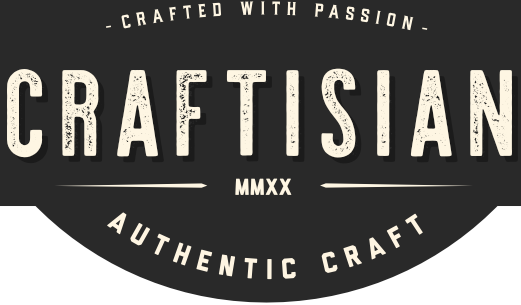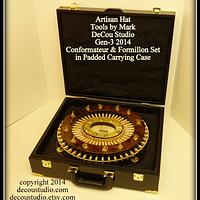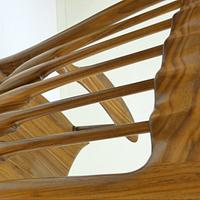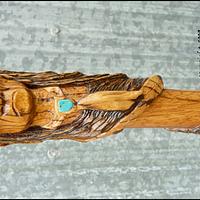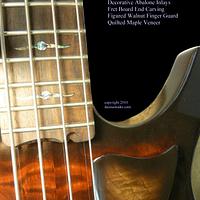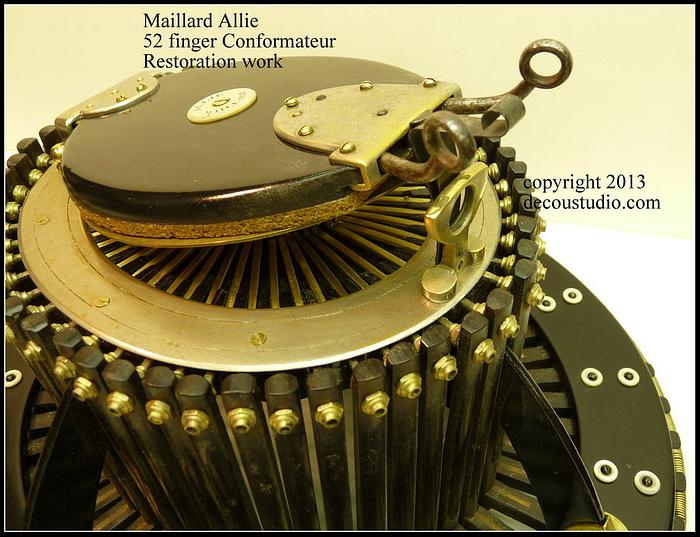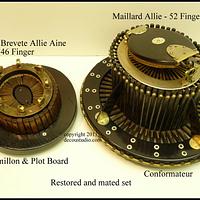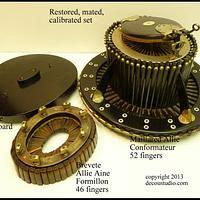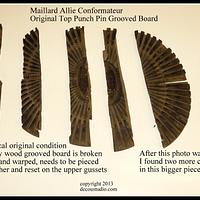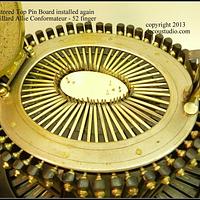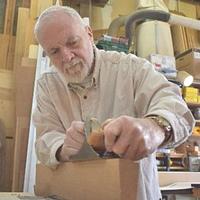Share your craft projects
Make new craft buddies
Ask craft questions
Blog your craft journey
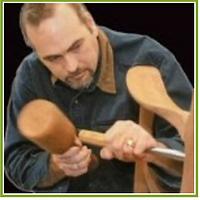
Mark DeCou Studio
9 posts
and
8 followers
in almost 12 years
in almost 12 years
More from Mark DeCou Studio
Restoration Maillard Allie Conformateur Brevete Allie Aine Formillon Hat Maker Head Measuring
Photos from my recent restoration of a Maillard Allie Conformateur, Brevete Allie Aine Formillon, and a Brevete Plot Board.
————————————-
But….What is it?
A Conformateur is used by hat makers to measure a customer’s head. A restored tool can accurately give a perfect representation of a client’s head shape and size.
A Conformateur is used by hat makers to measure a customer’s head. A restored tool can accurately give a perfect representation of a client’s head shape and size.
A Formillon is used to convert the size measurement of the conformateur into the shape that a hat can be formed on it.
A Plot Board allows the centerlines of the conformateur to be matched to the formillon.
Exact Dating on these is difficult for me, but I believe they range from 1850-1900. I think that this particular unit is from the earlier part of that range. They seem to get less intricate, and more cheaply built as time goes on and then they just stopped. The oldest units are even more intricate and fragile than this example.
——————————————-
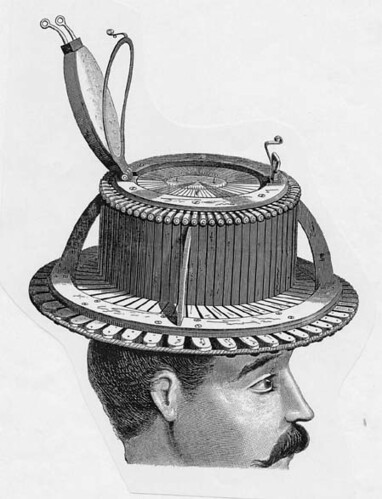
eBay’ers Note: If you are Googling to do some research of your own and found this listing, look through my “projects” listing, as I have several of these units shown and one of them may be a match to the one you are researching. If you are wanting pricing, a really rough three piece set is worth about $1000, a good set about $2500, a great set $4500, and a restored set is $6500-$7500, with all numbers subject to change. As with everything, the condition and who is shopping at the time are everything to determining a price, so don’t hold me responsible for anything you do with this data, it’s all just my opinion.

But….Who Wants it, or Who Needs it?
There seems to be two types of buyers of these antiques, the first being working hat makers who want to actually measure heads. The second group are scientific instrument collectors, and a growing group of Steampunk collectors. And to be honest, they just look cool, no matter who you are, or what you collect. However, they aren’t cheap, neither the rough antique, nor the work it takes to bring one back from the brink…...
Typically, these three pieces sell on eBay separately, but without all three pieces, they are useless to the hat maker. You need all three pieces to be mated, calibrated and in perfect working condition to accurately measure a person’s head, and convert that into a hat shape. Once that’s been purchased, the set has been restored, mated, and calibrated, they are very accurate.
I have done quite a few of these restorations, and try to post the ones that are different each time for the history and documentation. Over the years as I have watched all of the listings on eBay for this type of equipment, I have decided that my postings are used by “pickers” to make up their listings, and some times my photos have been used. Apparently, they do some quick google research on the label text, and quickly find my postings.
If I have missed one of these showing up on eBay, generally someone that is considering bidding on it will contact me with a link to the auction. They want my opinion and the estimated cost to restore the old tools. I can give an opinion, but not an estimate of the cost involved, since so much can be hidden in photos.
Bringing Them Back from the Dead….
To do this restoration work, I’ve accumulated a big pile of strange thread taps and dies, and some of threads I still can’t find, such as a #9-27 bolt thread.
To do this restoration work, I’ve accumulated a big pile of strange thread taps and dies, and some of threads I still can’t find, such as a #9-27 bolt thread.
I know when I tear into one of these, there are always going to be moments that I regret it, followed by a huge sense of accomplishment. I gain more confidence each time, and have a growing pile of fixtures and strange apparatus’ and special tools that I’ve built to reset everything just right, and a big collection of tiny brass screws and bolts of all types.
My next genesis in this work will be to polish and replate the brass with nickel. Not all of these units have nickel plating on the brass, but many do, and always it has nearly all worn off. I am not about to trust a plating shop with all of these irreplaceable little parts, so my next step will be to get the equipment and become proficient in brush plating copper and nickle. I worked in sales at a plating shop for a few years, and it’s interesting how things come back around.
This conformateur seemed to be in pretty good shape in the photos on eBay. After I received it here for an estimate, some of the problems I discovered. Once the estimate was approved and the work started, the disassembly process started and as I removed all of the fingers for cleaning, I discovered the Top Pin Slot Board was just in such bad shape that it was unusable.
This major work was not in the estimate…....I seem to get burned on these tools every time, it’s the only frustrating aspect of this type of work. The work is slow and tedious, and a hidden defect once discovered can quickly double the work hours…..such as this top pin board being in several pieces. Removing, restoring, and reinstalling the top pin board is a scary adventure, it is the basis for everything thing, if it isn’t level, flat, and positioned correctly, none of the 52 sliding fingers will work, and basically it’s just shelf-art…..and not cheap shelf-art.
I would never have had the confidence to tear one apart like this when I did the first few restorations, but each time I’ve gotten better and gained the confidence and devised fixtures to hold it all just right as it’s assembled. Now, they come into my little middle of nowhere Kansas studio from all over the World, it’s an amazing testimony to the power of Google and a digital camera.
What’s That Wood?
The wood on this unit is ebony wood. I find that these tools are often built with either ebony, or pear wood (my guess). The pear wood has an ebonized finish, so everything is black. But, there are a few of these units that have a thin textured bonded leather covering that is dyed black. Note: If anyone knows where to find new textured, very thin bonded leather suitable for covering curved parts without buckling, please let me know, it’s one of the things I’ve been hunting for.
What I’ve been finding is that the pear wood parts are not in good condition, and again I’m guessing (informed hypothesis yet to be confirmed scientifically) that the ebonizing process has destroyed the cellulose structure of the wood over the past 150 years. Again, I’m guessing, that the ebonizing process included iron oxide and acidic vinegar, and the acid has destroyed the fibers of the wood after so long.
What’s confusing is that not all of the pear wood parts are bad on every one of these tools, but I’m finding that if one section of pear wood is bad, all of the wood is bad on that tool. So, that doesn’t seem to mean that every tool with pear wood (best guess) has bad wood. But, the ebony doesn’t suffer from this degradation.
Ebony however has it’s own problems, and it has to do with the brittleness of the wood. If you don’t pre-drill a screw hole just the right size, the wood easily splits. If you stress the wood just wrong, it splits, if you set it down on the work bench too hard, it splits, if you turn your head and look back…..it might have split. I’m exaggerating there a little bit, but the ebony is brittle, that’s my point, and more brittle than you might expect, and so it’s easy to see why the Top Pin Slot Board can split into so many pieces as shown in the photos.
The pear wood takes screws easily, but suffers from the fiber degradation problem, meaning basically that there just isn’t any integrity or durability to the wood, it acts sort of like balsa wood, just breaks very easily without any long strings of fibers, just snaps. It also crushes very easily, which is a big problem when the brass punch pins are held in place by two nuts (another thread pitch and size that is odd) that clamp the wood finger, holding it in place with friction. This friction clamping easily crushes the wood. On these units, I have to replace all of the wooden “L” shaped fingers, which is costly. On the units where the pear wood is not bad, it holds up just fine, and is easily reusable.
It Just Looks Cool….
From an aesthetic standpoint, these tools just look cool. The black colored wood is a striking contrast to the mother-of-pearl, brass, and nickle plating. The mother-of-pearl shows up as the white things in the photos, once cleaned and polished they gleam. Some of these tools I receive for restoration have brass washers, and I don’t know yet whether that was done by a previous repair person, or if some of them were originally sold at a lower price with the brass washers. Any which way though, they are just beautiful, and I’m always amazed at the skilled and masterful hands that built these units originally.
But…Where are they From?
The labels on these indicate Paris, but they MAY have been built in Italy on subcontract. Don’t quote me on that, as I don’t have any documentation on that yet to prove it, it’s just some discussion between us folks that collect and use these tools today. So far, none of us that I talk with have found documentation to say what happened to the workshop that original built these. With two world wars in Europe, they could have been firebombed by either side, or sold as scrap to make bullets, I’m just not sure at this point. Boy Howdy though, I’d love to stumble onto an auction where all of the old fixtures, special tools, and spare parts were being sold for scrap prices…...they would be worth far more than bullets, and that’s saying something in today’s crazy World.
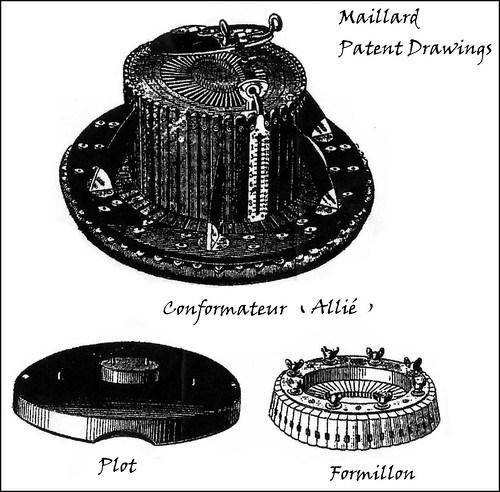
I was going through some old photos looking for the Conformateur Patent Drawings and I rediscovered this photo of my daughter sharing my bench while I am working on another Conformateur. This photo was taken 4 years ago, and she has made many of the punch copper art pictures since then. I help her with framing and matting the work, and overseeing the project. Now that she’s homeschooling, I’m the “art” teacher, which you really couldn’t find a more enjoyable job for a Dad like me.
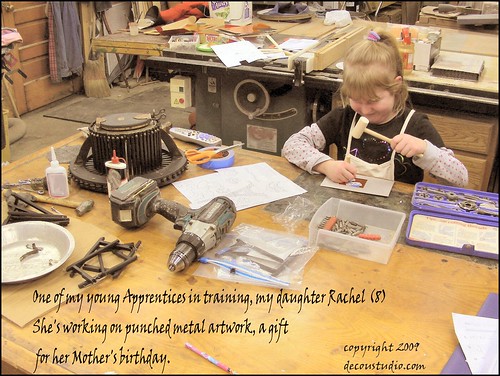
thanks for looking,
Mark A. DeCou
Mark A. DeCou
(note: all text and photos are protected by copyright 2013, no unauthorized use in part, or whole is allowed without expressed written consent by the author, M.A.DeCou)
Mark DeCou Studio (decoustudio.etsy.com)
1 Comment
Hi Marc.Great to see your work again, you always work on the most unique projects and do such specialized items. As always so very well done.
woodworking classes, custom furniture maker








